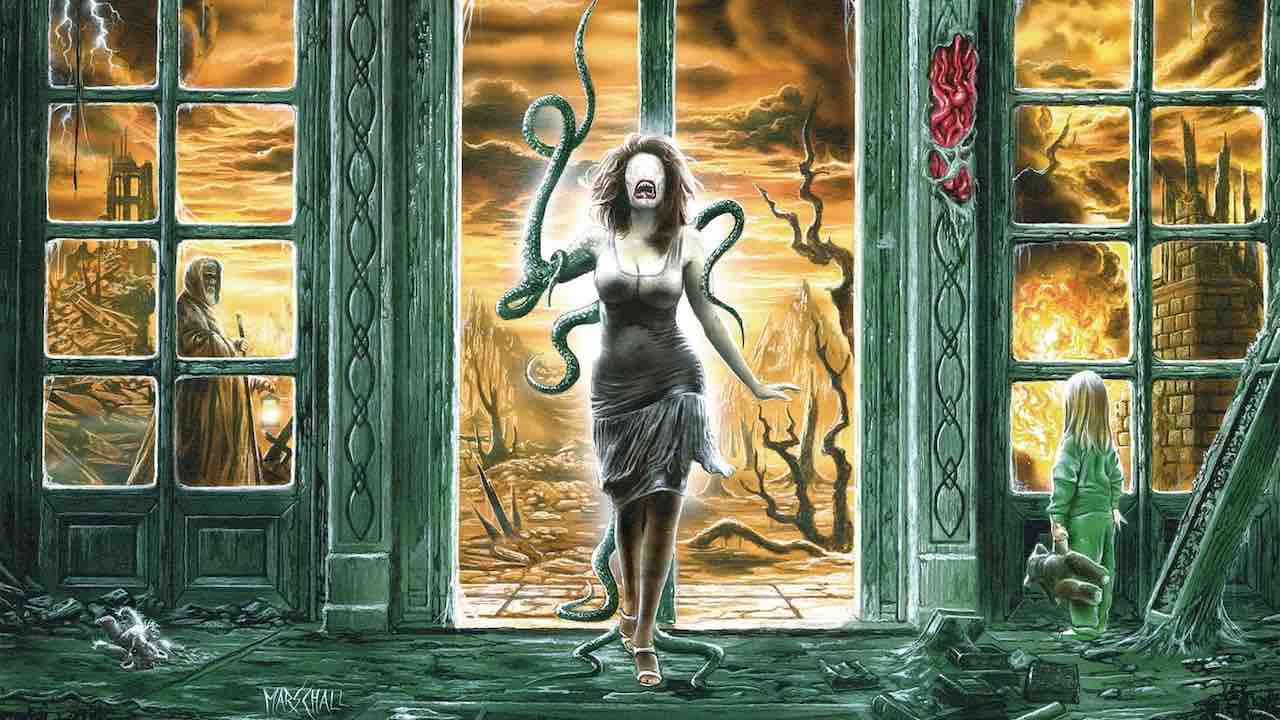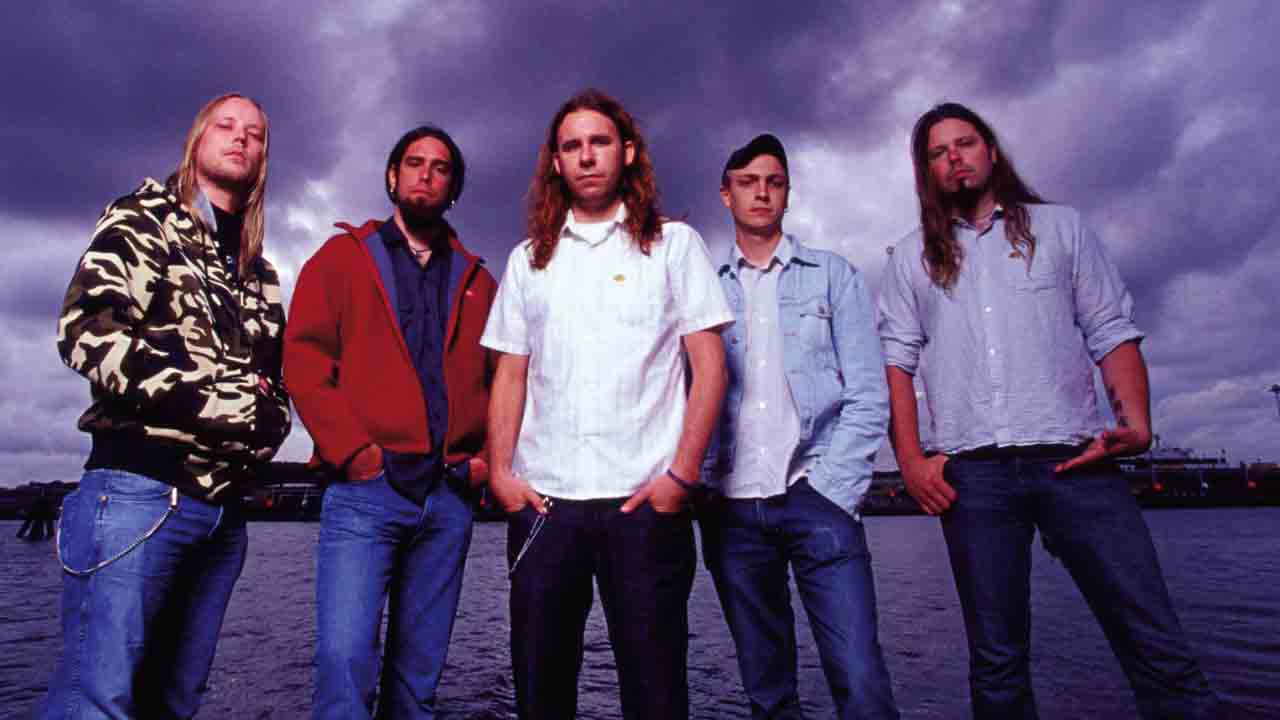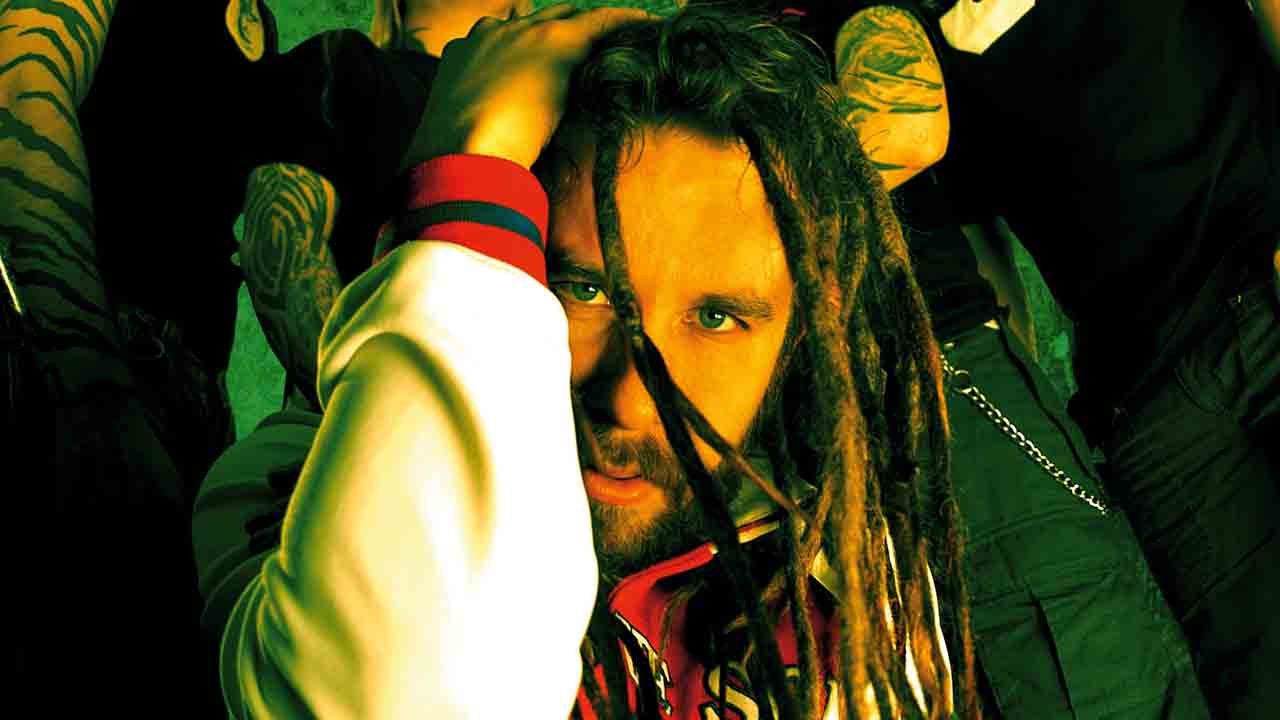In Flames’ Whoracle: the inside story of a 90s melodeath classic
How what began as a death metal side project accidentally made one of the most influential metal albums of the 90s

In Flames started in Gothenburg in 1990 as a side project for Jesper Strömblad – then guitarist with death metallers Ceremonial Oath – keen to throw a little melody into his life. Three years later the fire burnt so brightly that Jesper made this band his full-time commitment, alongside guitarist Glenn Ljungström and bassist Johan Larsson. With Jesper also on drums and keyboards, In Flames released their debut album, Lunar Strain, in 1994 on the Wrong Again label; Dark Tranquillity’s Mikael Stanne guested on vocals.
By 1996, the band had signed to Nuclear Blast and expanded the permanent line-up with vocalist Anders Fridén and drummer Bjorn Gelotte joining. The same year they released The Jester Race album, and started to build a real momentum. During 1997, In Flames took a major leap forward with Whoracle.
Let’s start off by dispelling something of a myth that’s grown up around this record: according to Jesper it is not a concept album. At all.
“Not as far as I know!” says Jesper, who stayed with the band until his departure in 2010. “I wasn’t involved at all in the lyrical side. But all the reports that Anders came up with this story of Armageddon and the end of the world, and then the re-birth of the planet… I’ve read them, but that’s really not the way I recall things. Sure, there were a few songs on the album which had that sense of global doom about them. But it wasn’t solely what we were about.”
- The 50 best death metal albums ever
- 15 of the best metal bands from Sweden
- Every Metallica album ranked from worst to best
- Slipknot vs Mushroomhead: revisiting nu metal’s most ridiculous feud
While we’re on the subject of the lyrics, it’s interesting to note that Dark Tranquillity guitarist Niklas Sundin is credited as being heavily involved on this side. Why go with him?
“Niklas helped us out with the lyrics on The Jester Race,” recalls the guitarist. “It was just that Anders wasn’t at all confident about his English, and the rest of us didn’t feel able to help him, either. So Anders chose to work with Niklas, who was a good friend. I wouldn’t say he wrote the songs as such. What he did was interpret Anders’ ideas and put them into English. You could say that he was a translator. But because he understood what we were trying to say, he was able to capture the atmosphere and make it work lyrically.”
Up until then the band had always recorded at Studio Fredman in Gothenburg, and they saw no reason to change this arrangement for Whoracle, although they did decide to give Fredrik Nordström, the studio’s owner, a more prominent role on the new record, acting as co-producer.
Sign up below to get the latest from Metal Hammer, plus exclusive special offers, direct to your inbox!

However, the guitarist recalls his time working with the famed Swedish metal producer as being less than amicable. In fact, he’s positively hostile about the recollections.
“I would have to say that Fredrik was an asshole towards me in the studio. Really, he was. He didn’t just push me to get the best I could do, but he would insult my work. I found him very hard to work with, and never liked him being around. I was delighted when we finally moved on from him and got in another producer [Daniel Bergstrand, for 2002’s Reroute To Remain].”
So, how did Jesper feel about constantly returning to the scene of the ‘crime’, as it were? Being asked once again to deal with a man for whom he clearly didn’t have much affection?
“It was a case of not having much choice back then. Studio Fredman was the best one in Gothenburg for metal bands, and our budgets were always very small in the 1990s, so we didn’t have the money to go elsewhere. Therefore, I just had to accept that we had to be there, and I just had to deal with the situation as best I could.”
But how does a guitarist deliver his best work when he regards the producer as an ‘asshole’? Jesper almost backtracks a little on his previous comments.
“Well, perhaps I’m being too harsh in calling him an ‘asshole’. I guess what I meant was that he drove me a little too hard, but it’s OK because what ended up on the records, including Whoracle, does sound good. And he was great at getting the right mix for us, capturing what In Flames were all about. So any personal feelings I might have had should be offset against the overall job he did.
“Actually, we loved to be in the studio back then. It was a very exciting place for us. To be able to bring to life our songs was all we could ask. And we’d always try to stretch out our time in Studio Fredman. However long we were officially booked in for, we’d always want more time.”
But, as Jesper’s already indicated, In Flames were not working with budgets that could bankroll a small nation for a year. On the contrary, they were given very little cash, and had to make it work as best they could. Which meant their preparation had to be faultless if they were to maximise their recording time.
“We spent about three weeks in total on Whoracle during the late spring and early summer of 1997, to record the basic tracks and then mix them. That’s not a long time. So, we had to ensure all the songs were written, rehearsed and ready before we got to the studio. There wasn’t even time for any pre-production. All that meant Fredrik had no involvement in the songs at all. They were completely worked out. If we hadn’t done that, then the album would have sounded disjointed and poor. We learnt the discipline of not using recording time for writing, which other bands do.”
One interesting choice of song was Everything Counts, originally done by Depeche Mode. Not the sort of inspiration you’d expect to enter the world of In Flames. So time to find out who came up with the idea. And the winner is…
“It was Anders! We’d wanted to do a cover for a while, but really didn’t feel like going down the route of doing something obvious like Iron Maiden [although In Flames did record their version of Murders In The Rue Morgue for the 1998 tribute album Made In Tribute]. Anders suggested we try Everything Counts and, at first, we were all reluctant, because we couldn’t see how a Depeche Mode song could work. But we tried playing it… and it just fitted us perfectly. It was so metal. The fans certainly liked it; on the subsequent tour, we had it in our set and this went down really well.”
The band also recorded the tracks for the Black-Ash Inheritance EP during these sessions at Studio Fredman, although at the time they had no idea there would be an EP released prior to Whoracle.
“Well, we did this song called Goliaths Disarm Their Davids, which we decided wasn’t right for the album. But then Nuclear Blast came up with a marketing plan which included the idea of releasing a shaped disc in advance of the album. That was what became the Black-Ash Inheritance record. So, we put on Gyroscope, which also ended up on Whoracle, plus Goliaths Disarm Their Davids, a live version of Behind Space and… we needed a fourth song.
“We actually went back into the studio and did an acoustic track, which had little bits from other songs we’d done, and called it Acoustic Medley, which was very clever of us,” recalls Jesper.

Black-Ash Inheritance came out in August 1997 (“I still don’t know why we did it. In those days, the record label said something and we just blindly obeyed!”), with Whoracle following in November that year. It gave the band a massive shot in the arm. Building on the impact of The Jester Race, it even took them into the charts in both Finland and Germany, and it was the first indication that there was serious commercial potential.
“I don’t tend to have fond memories of any of our albums,” laughs Jesper. “Once they’re done, that’s it for me. You move on. But Whoracle was an important point in our career – a crossroads. Up until that time we all had day jobs. There wasn’t enough money from album sales or touring to keep us in food and drink. But there was an increasing demand for In Flames. And all five of us were faced with a choice: either to throw ourselves full-time into the band, or else to quit and go back to normality.”
For Jesper, Anders and Bjorn, the choice was straightforward. They were all dedicated to taking In Flames as far as they could. But there was a shock around the corner.
“When Glenn told us that he couldn’t make such a commitment to the band, none of us were too surprised. He went back to his day job. But none of us expected Johan to jack it in. However, he fell in love with a girl in America and decided to hang up his bass. That really stunned us, but we moved on.”
Peter Iwers came in to replace Johan Larsson, while Niklas Engelin (now of Engel) was brought in as a touring guitarist in place of Glenn Ljungström.
“We were delighted to find Peter, because he fitted right in. But Niklas was never a full-time member of the band. He was brought in so that we could carry on touring on the back of Whoracle.”
So, is Jesper proud of what In Flames achieved on Whoracle?
“What this record did for us more than anything else was to convince us to take In Flames seriously. It was another stepping stone in our career, and helped to get us wider acknowledgement. We got to tour with Dimmu Borgir and also to go to Japan for the first time. That was vital.”
Published in Metal Hammer #186
Malcolm Dome had an illustrious and celebrated career which stretched back to working for Record Mirror magazine in the late 70s and Metal Fury in the early 80s before joining Kerrang! at its launch in 1981. His first book, Encyclopedia Metallica, published in 1981, may have been the inspiration for the name of a certain band formed that same year. Dome is also credited with inventing the term "thrash metal" while writing about the Anthrax song Metal Thrashing Mad in 1984. With the launch of Classic Rock magazine in 1998 he became involved with that title, sister magazine Metal Hammer, and was a contributor to Prog magazine since its inception in 2009. He died in 2021.

